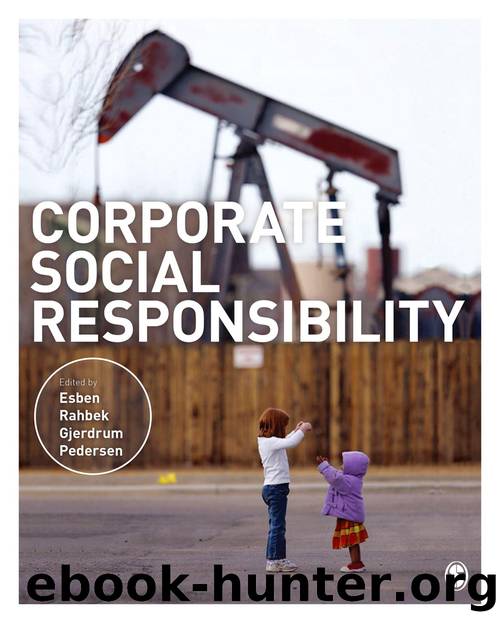Corporate Social Responsibility by Pedersen Esben Rg

Author:Pedersen, Esben Rg [Pedersen, Esben Rg]
Language: eng
Format: epub
Publisher: SAGE Publications
Published: 2015-01-21T16:00:00+00:00
Dialogue at all levels is central in the CoC development process. As mentioned earlier and as we will return to later, CoC have sometimes been criticised for being planned and implemented in a top-down fashion where suppliers and other stakeholders have little or no influence on the process. However, stakeholder dialogue is nonetheless a crucial part of a successful CoC implementation (Mamic, 2005, p. 85). For instance, it will be easier to get buy-in from suppliers if they have been actively involved in shaping the CoC. Moreover, other stakeholders (e.g. NGOs and community groups) may also play a role in highlighting issues and identifying risks that the company has previously been unaware of.
Case study 6.2
Guidelines for responsible supply chain management
The purpose of the Danish Council on Corporate Social Responsibility (DCCSR) is to support and contribute to the Danish companies’ work on CSR. In June 2010, DCCSR published a set of guidelines for sustainable supply chain management to ensure that suppliers meet social and environmental requirements and expectations. The guidelines include the following recommendations:
Companies prepare a strategy for sustainable supply chain management.
Company strategies are embedded in management, organisation and business operations.
Companies develop their supply chain management based on an assessment of the likelihood of violations of fundamental rights and principles in their supply chain, and target their efforts and purchases to areas where they are expected to have the most impact.
Based on their risk assessment, companies request and establish a dialogue with their suppliers to create continuous improvement, including, if necessary, the monitoring of selected supplier activities, cooperation, capacity building and/or training .
Companies involve their stakeholders in their social and environmental improvements.
Companies discontinue cooperation in the event of gross violations of fundamental rights if the violations do not cease despite demands.
Companies communicate openly and credibly about their efforts, achievements and continued risks to customers, consumers and other stakeholders (DCCSR, 2010, p. 6).
Download
This site does not store any files on its server. We only index and link to content provided by other sites. Please contact the content providers to delete copyright contents if any and email us, we'll remove relevant links or contents immediately.
Tools of Titans by Timothy Ferriss(8359)
Change Your Questions, Change Your Life by Marilee Adams(7731)
Deep Work by Cal Newport(7054)
Playing to Win_ How Strategy Really Works by A.G. Lafley & Roger L. Martin(6202)
Man-made Catastrophes and Risk Information Concealment by Dmitry Chernov & Didier Sornette(5993)
Digital Minimalism by Cal Newport;(5743)
Big Magic: Creative Living Beyond Fear by Elizabeth Gilbert(5739)
Ego Is the Enemy by Ryan Holiday(5406)
The Slight Edge by Jeff Olson(5403)
The Motivation Myth by Jeff Haden(5199)
The Laws of Human Nature by Robert Greene(5154)
Stone's Rules by Roger Stone(5073)
Tuesdays with Morrie by Mitch Albom(4762)
Eat That Frog! by Brian Tracy(4509)
Rising Strong by Brene Brown(4442)
Skin in the Game by Nassim Nicholas Taleb(4232)
The Money Culture by Michael Lewis(4182)
Bullshit Jobs by David Graeber(4176)
Skin in the Game: Hidden Asymmetries in Daily Life by Nassim Nicholas Taleb(3986)
